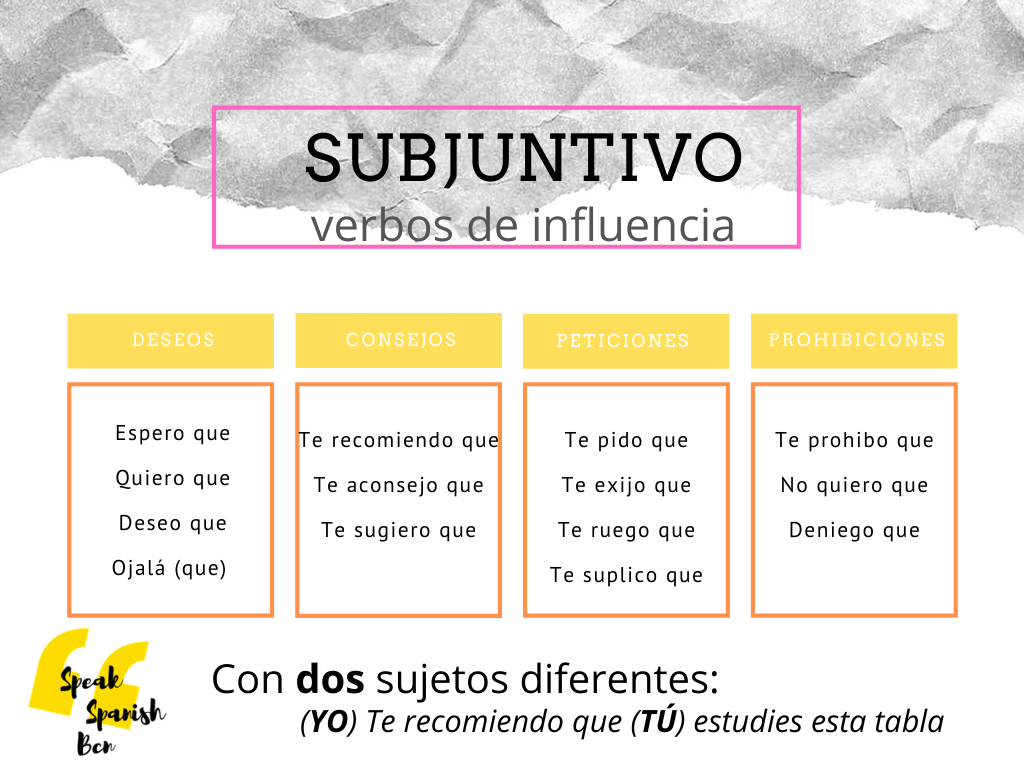Don’t you know when to use subjunctive in Spanish language? Here I am going to explain you one of the uses.
According to the Real Academia de la Lengua Española (Royal Academy of the Spanish Language), the subjunctive mood is used to communicate virtual information, that is, not experienced. A few lines below you will see examples.
As for its presence in the different languages of the world, it is mainly found in Romance languages such as Portuguese, Italian, Catalan, French, Romanian and Spanish. In this language, the subjunctive is characterized by influencing hypothetical or uncertain statements, such as wishes, probability or emotions.
In this table I present one of the many uses of the subjunctive: influencing people’s behavior and decisions by expressing wishes (deseos), recommendations (consejos), requests (peticiones) and prohibitions (prohibiciones).

So, when you wish someone something, advise your friends, make requests or prohibit certain things, in Spanish we use the verbs of influence (esperar, recomendar, pedir, prohibir, etc.), the particle que (that) and then the present of subjunctive. For example, espero que aprendas el subjuntivo.
Differences in meaning between pedir, suplicar and rogar
It is important to know how to correctly apply the verbs of influence in the right context. For example, if a student never does homework, the teacher might say:
Te pido que hagas los deberes, Paco
But teacher couldn’t tell him:
Te suplico que hagas los deberes, Paco
Why?
The verb suplicar (to supplicate) and rogar (to beg) indicates that a request is made in a desperate and insistent way, almost crying. According to this, it would be much more normal for the teacher to indicate her request in a neutral way -with the verb pedir (to ask)-, or a little more angry -with the verb exigir (to demand)-. A verb, by the way, irregular in the first person, look:
| yo | exijo |
| tú | exiges |
| Él/Ella Usted | exige |
| Nosotros-as | exigimos |
| Vosotros-as | exigís |
| Ellos-as | exigen |
Differences in meaning between aconsejar and sugerir
The same happens when we go to a restaurant and the waiter suggests the dish of the day. Ideally, the waiter would say something like this:
Te sugiero que pidas el plato del día, seguro que te gusta
But it would sound a little weird if the waiter told you:
Te aconsejo que pidas el plato del día, seguro que te gusta
Why?
While the verb aconsejar (to advise) expresses what a person should do for their own good and, therefore, is much more direct, the verb sugerir (to suggest) inspires or evokes the proposed idea in someone, making it more respectful and distant.
Oh, by the way! The verbs pedir (to ask) and sugerir (to suggest) are also irregular, look:
| yo | sugiero |
| tú | sugieres |
| Él/Ella Usted | sugiere |
| Nosotros-as | sugerimos |
| Vosotros-as | sugerís |
| Ellos-as | sugieren |
| yo | pido |
| tú | pides |
| Él/Ella Usted | pide |
| Nosotros-as | pedimos |
| Vosotros-as | pedís |
| Ellos-as | piden |
Conclusions and practice
Now you know in which situations to use the present subjunctive: to influence people’s decisions and behaviors by expressing wishes, recommendations, requests and prohibitions.
Before jumping in the deep, practice a bit with these phrases:

No responses yet